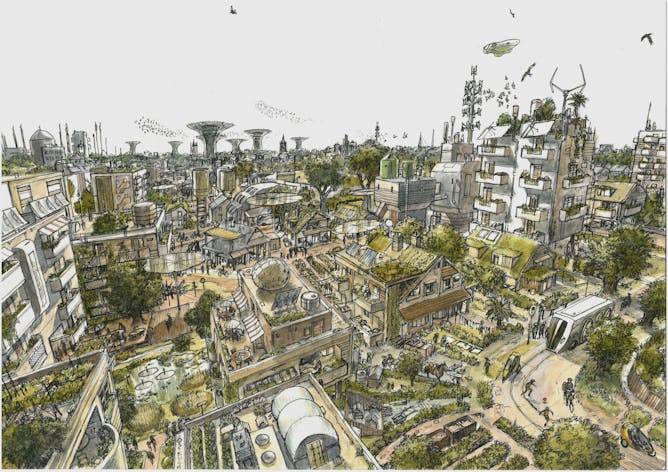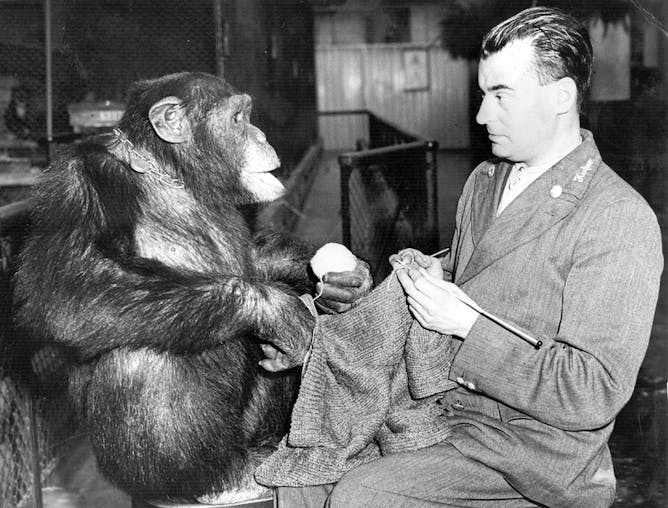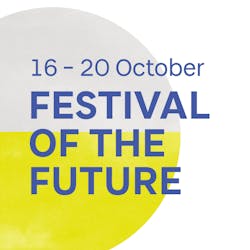|
|
|
Editor's note
|
|
It’s day ten of Extinction Rebellion’s demonstrations, and tensions are running high in occupied cities all over the world. But whatever you think about them, or their tactics, one thing it’s hard to get upset about is the cleaner air in blockaded streets. And in this, they offer a window on to some of the positive aspects of creating a greener future – climate change policies are not necessarily all about sacrifice.
To illustrate this, Paul Chatterton, has written a visionary story today that will allow you explore a beautiful, safe, and sustainable city of 2025, a city radically different to most around the world but, crucially, one that is inspired only by current initiatives and workable theories. Fighting climate change demands dreams – so here’s one.
You can also find out what analysis of 200 years of written text tells us about what makes people happy. And how did humans evolve in the first place? Lab-grown mini brains reveal how humans diverged
from apes.
|
Josephine Lethbridge
Interdisciplinary Editor
|

|
|
|
|

© James McKay
Paul Chatterton, University of Leeds
We need to create a transport system that is zero carbon – and socially just – in only a few years. We just need to recognise that it's possible.
|

Mr Bown Jackieas with chimpanzee at the London zoo in 1938.
wikipedia
Silvia Benito Kwiecinski, University of Cambridge
What makes us human? Scientists are starting to work out the specific evolutionary genetic changes that enabled the large and complex brains of humans.
|

Researchers used a statistical algorithm to analyse written texts between 1820-2009 in four Western countries.
sirtravelalot/Shutterstock
Thomas Hills, University of Warwick; Chanuki Illushka Seresinhe, The Alan Turing Institute; Daniel Sgroi, University of Warwick; Eugenio Proto, University of Glasgow
Of the countries we looked at, all have seen an increase in subjective happiness since the 1970s.
|
Environment + Energy
|
-
James Robbins, University of Portsmouth; Sarah Marley, University of Portsmouth
Dead whales usually sink, so most evidence of 'ship strikes' quickly disappears beneath the waves.
-
Jeff Kettle, Bangor University
Don't expect the new technology to become solar's dark twin just yet, but it could play an important role in energy demands of the future.
-
Md Arif Hasan, Victoria University of Wellington; Ralph Brougham Chapman, Victoria University of Wellington
In New Zealand, where more than 80% of electricity is renewable, the carbon footprint of electric cars is 62% lower than that of fossil cars. But their lithium battery has other environmental impacts.
|
|
Politics + Society
|
-
Cengiz Gunes, The Open University
Russia left as the main power broker as the Turkish invasion of northeastern Syria continues.
-
Laura Abbott, University of Hertfordshire
Research offers an insight into the experiences of pregnant women left to give birth in their cells without midwives
-
Omar Safi, University of Portsmouth
Parts of Tunisia's political discourse look a lot like its colonial past.
|
|
Health + Medicine
|
-
Dolly Theis, University of Cambridge
British people are increasingly eating out. Menu labelleling is a way to ensure they make healthy choices.
-
Cat Pausé, Massey University
The British Psychological Society is calling for a language change, from 'obese people' to 'people living with obesity'. But using the word obesity can reinforce rather than prevent stigma.
|
|
Business + Economy
|
-
Markos Zachariadis, Warwick Business School, University of Warwick
A lot of banks started experimenting with blockchain in 2015 but they've made little progress.
-
Rebecca Edwards, Rochester Institute of Technology
Up until the 1919 Black Sox Scandal, gambling and baseball had a marriage of convenience. A century later, gambling is again being seen as a solution to the sport's woes.
|
|
Arts + Culture
|
-
Sabine Jacques, University of East Anglia
The use of a song written by a convicted sex offender in the film Joker has caused controversy over royalty payments.
-
Tanya Horeck, Anglia Ruskin University
Sky’s true crime channel is feeding a ‘desktop detective’ culture.
|
|
Science + Technology
|
-
Harry Hoster, Lancaster University; Katy Mason, Lancaster University
Electrifying transport needs bigger changes than another high-end electric car.
|
|
| |
| |
| |
| |

|
| |
| |
| |
Featured events
|

|
Bonar Hall University of Dundee, Dundee, Dundee City, DD1 4HN, United Kingdom of Great Britain and Northern Ireland — The Conversation
|

|
Bonar Hall University of Dundee, Dundee, Dundee City, DD1 4HN, United Kingdom of Great Britain and Northern Ireland — The Conversation
|

|
King Henry Building, King Henry I Street, Portsmouth, Hampshire, PO1 2DY, United Kingdom of Great Britain and Northern Ireland — University of Portsmouth
|

|
Leeds Art Gallery, The Headrow, Leeds, Leeds, LS1 3AA, United Kingdom of Great Britain and Northern Ireland — University of Leeds
|
|
|
|
| |
| |
| |
| |
| |
|
|
|
|
|
|
|